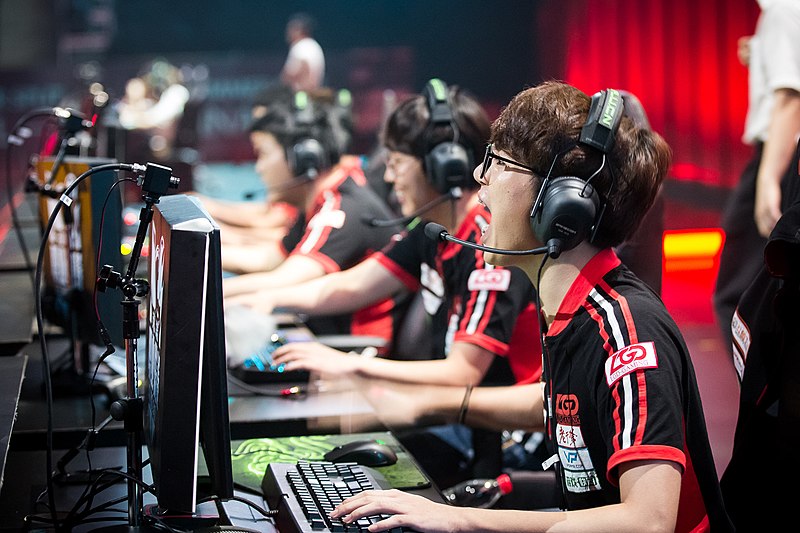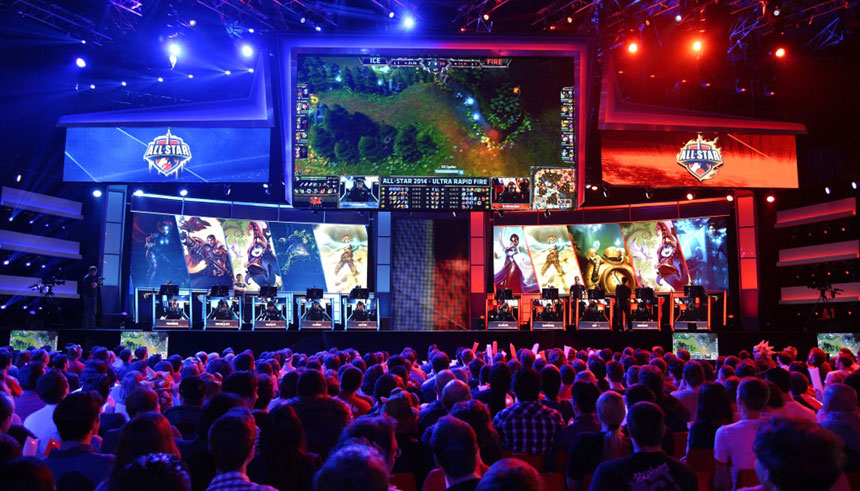electronic sports, or e-sports. What began as a niche hobby has evolved into a global phenomenon, captivating millions of gamers and spectators alike. This article explores the rapid rise of e-sports, its transformation into a legitimate industry, and the profound global impact it has had on the world of entertainment and competition.
Electronic sports, or e-sports, have undergone a meteoric rise that has reshaped the landscape of entertainment and competition. This transformation from a niche hobby into a global phenomenon is a testament to the power of technology, community, and the universal appeal of competitive gaming. Let’s delve deeper into the multifaceted evolution of e-sports and the significant global impact it has engendered:
Technological Advancements: E-sports owe much of their growth to the rapid advancement of technology. High-speed internet, powerful gaming hardware, and sophisticated streaming platforms have made it possible for gamers to compete and audiences to spectate in real time, transcending geographical barriers.
Diverse Game Titles: E-sports encompass a wide range of game titles, from strategy games like “League of Legends” to first-person shooters like “Counter-Strike” and sports simulations like “FIFA.” This diversity allows e-sports to cater to various tastes and preferences.
Global Player Base: E-sports have cultivated a vast and diverse player base, with gamers of all ages and backgrounds participating. The accessibility of gaming platforms and the allure of competition have united individuals from different corners of the world.
Professionalization: E-sports have evolved into a legitimate industry with professional players, teams, coaches, and sponsors. This professionalization has brought unprecedented levels of investment, organization, and structure to the e-sports ecosystem.
Spectator Engagement: E-sports have redefined spectator engagement. Live-streamed tournaments, commentaries, and immersive viewer experiences have made watching e-sports as thrilling as traditional sports, if not more so.
Massive Events: E-sports events are now hosted in massive arenas and stadiums, drawing audiences that rival those of traditional sports. The pinnacle of e-sports, such as the League of Legends World Championship, can fill arenas with tens of thousands of spectators.
Global Fan Base: E-sports have a global fan base that spans borders. Fans passionately support their favorite teams and players, creating a sense of community that transcends nationality.
Economic Impact: The e-sports industry has a significant economic impact, generating revenue through advertising, sponsorships, merchandise sales, and media rights. Major companies and brands have recognized the potential of e-sports as a marketing platform.
Cultural Influence: E-sports have influenced popular culture, with e-sports celebrities, esports-themed content, and gaming becoming mainstream. It has helped bridge generational and cultural gaps, making gaming a shared experience for many.
Education and Career Opportunities: E-sports have created educational and career opportunities, from scholarships for collegiate e-sports to employment in various facets of the industry, including event management, content creation, and marketing.
Global Competition: E-sports provide a platform for global competition, where players from different countries compete on equal footing. It fosters international camaraderie and understanding through shared passion.
Innovation: E-sports continually push the boundaries of innovation, from virtual reality tournaments to groundbreaking game designs. This innovation spills over into the broader tech and entertainment industries.
In conclusion, the rise of e-sports represents a remarkable fusion of technology, community, and competition. It has transformed from a niche interest into a global phenomenon, redefining entertainment and competition for millions. E-sports’ influence extends far beyond the gaming world, impacting the realms of culture, economy, and education. As it continues to evolve and captivate audiences worldwide, e-sports stand as a testament to the dynamic synergy between digital technology and the human spirit’s innate drive for competition and camaraderie.
For a comprehensive look at this subject, we invite you to read more on this dedicated page: Branding in the Age of Social Media

The roots of e-sports can be traced back to the early days of video gaming. As multiplayer video games became more popular, informal competitions and gatherings sprouted. Arcades and LAN parties were the breeding grounds for the budding e-sports culture. However, it wasn’t until the late 1990s and early 2000s that organized e-sports tournaments began to take shape, with games like “Counter-Strike” and “StarCraft” leading the way.
The journey of esports, from its humble beginnings in the early days of video gaming to the global phenomenon it is today, is a testament to the passion, innovation, and community that have driven its evolution. Let’s delve deeper into the fascinating history of esports:
1. Birth in Arcades and LAN Parties: Esports found its roots in the arcades and LAN (Local Area Network) parties of the late 20th century. Gamers, driven by their love for competitive play, started organizing informal competitions among friends and fellow enthusiasts. These gatherings were the fertile grounds where the spirit of esports first began to take shape.
2. Rise of Competitive Titles: Certain video games, due to their strategic depth, balance, and competitive appeal, played a pivotal role in shaping early esports. Titles like “Counter-Strike” and “StarCraft” gained immense popularity within the gaming community for their competitive multiplayer modes. These games became the cornerstones upon which organized esports competitions would be built.
3. Emergence of Professional Leagues: In the late 1990s and early 2000s, esports took a significant step forward with the establishment of professional leagues and tournaments. Organizations like the Cyberathlete Professional League (CPL) and Major League Gaming (MLG) began hosting structured competitions, complete with cash prizes and sponsorship deals. This marked the formalization of esports as a legitimate industry.
4. Spectatorship and Broadcasting: The advent of online streaming platforms and esports-focused television networks helped bring competitive gaming to a global audience. Fans could now watch their favorite players and teams compete in real-time, ushering in a new era of esports spectatorship. Major tournaments, like the Intel Extreme Masters and The International (for “Dota 2”), became must-watch events.
5. Recognition and Investment: As esports continued to gain traction, it garnered attention from major investors, sponsors, and even traditional sports organizations. Esports teams and players began to secure lucrative sponsorship deals and partnerships. This recognition from outside the gaming community catapulted esports into the mainstream consciousness.
6. Diversity of Titles: Esports’ growth is also attributed to the diversity of gaming titles and genres that have entered the competitive scene. From first-person shooters to real-time strategy games, battle royales, and sports simulations, there’s now an esports title to suit nearly every gaming preference.
7. International Phenomenon: Esports transcended national borders and became a truly international phenomenon. The rise of esports powerhouses like South Korea and China, along with the globalization of major tournaments, has transformed esports into a global cultural phenomenon.
8. Evolution of Infrastructure: Esports has seen a rapid evolution in infrastructure, including state-of-the-art arenas, dedicated training facilities, and professional coaching staff. Universities now offer esports scholarships, further legitimizing competitive gaming as a viable educational pursuit.
In summary, the journey of esports has been marked by passion, innovation, and an unwavering commitment to competition. From its humble beginnings in arcades and LAN parties, it has evolved into a global industry with millions of fans, professional players, and substantial prize pools. The ongoing growth of esports serves as a testament to the enduring appeal of competitive gaming and the boundless potential for innovation in the digital age. As esports continues to thrive, it will undoubtedly shape the future of sports and entertainment, offering new generations of gamers the opportunity to compete, spectate, and celebrate the spirit of competition on a global stage.
For additional details, consider exploring the related content available here Gaming & Esports Sector Is The Next Frontier for Media | BCG

The turning point came with the widespread availability of high-speed internet and live-streaming platforms. Gamers could now compete on a global scale, and audiences could watch their favorite players and teams from anywhere in the world. Streaming platforms like Twitch turned gamers into celebrities, and e-sports began attracting significant investments from both traditional sports organizations and tech companies.
nullIf you’d like to dive deeper into this subject, there’s more to discover on this page: Esports Industry in 2022: Market Stats & Viewership Growth Trends

E-sports transitioned from casual competitions to fully professional leagues. Organizations like the Overwatch League, League of Legends Championship Series (LCS), and Dota 2’s The International started offering multi-million-dollar prize pools. This influx of money and corporate sponsorship brought a new level of legitimacy to competitive gaming.
The evolution of esports, from informal contests to fully-fledged professional leagues, represents a remarkable journey that has reshaped the entire landscape of competitive gaming. Let’s delve into the profound transformations that have occurred as esports soared to unprecedented heights:
Rise of Esports Leagues: The establishment of esports leagues, such as the Overwatch League, League of Legends Championship Series (LCS), and Dota 2’s The International, marked a significant turning point. These leagues introduced structured, season-based competitions that mirrored traditional sports, complete with regular seasons, playoffs, and championship events.
Astronomical Prize Pools: One of the most striking developments has been the staggering growth of prize pools in esports tournaments. Million-dollar payouts have become the norm, with some events offering tens of millions in prizes. This has not only attracted top-tier talent but also catapulted esports into the realm of high-stakes, life-changing competition.
Corporate Sponsorship: Corporate sponsorship deals flooded into esports, reflecting the growing recognition of its immense potential. Major brands from various industries, including tech giants, energy drinks, and sportswear companies, eagerly aligned themselves with esports teams and events. These partnerships injected substantial financial backing into the ecosystem.
Global Recognition: Esports has transcended national boundaries, garnering global recognition. International competitions draw audiences that rival traditional sporting events, with fans from every corner of the world tuning in to support their favorite teams and players.
Professional Infrastructure: The growth of esports has necessitated the development of a robust professional infrastructure. Teams now feature coaches, analysts, managers, and support staff, mirroring the structure of traditional sports organizations. This professionalization has elevated the level of competition.
Streaming Revolution: Streaming platforms, particularly Twitch, have become the primary means of broadcasting esports events. They offer interactive viewing experiences, with viewers able to engage with players and fellow fans in real-time. This accessibility has democratized esports, allowing anyone with internet access to participate as a spectator.
Player Salaries and Benefits: As esports players gained superstar status, their compensation packages expanded. Top-tier players now receive substantial salaries, endorsement deals, and even health benefits, akin to professional athletes in traditional sports.
Diversity and Inclusion: The esports community is increasingly emphasizing diversity and inclusion. Efforts to create opportunities for women and underrepresented groups are underway, as the industry seeks to ensure that esports is accessible and welcoming to all.
Educational and Career Pathways: Esports has opened doors to educational and career opportunities. Universities now offer esports scholarships and degree programs, and careers in esports management, broadcasting, and event production are on the rise.
Mainstream Media Coverage: Traditional media outlets have recognized the significance of esports and are providing extensive coverage. Esports events are broadcast on television, featured in newspapers, and covered by major news networks, further legitimizing the industry.
In conclusion, esports has not merely transitioned from casual gaming to professional competition; it has become a global phenomenon that mirrors, and in some cases surpasses, traditional sports in terms of viewership, revenue, and investment. The immense growth, financial backing, and mainstream recognition have solidified esports as a legitimate and influential force in the world of entertainment and competition, with a promising future that continues to evolve and captivate audiences worldwide.
Looking for more insights? You’ll find them right here in our extended coverage: Understanding Esports from the Perspective of Team Dynamics …

E-sports is no longer a subculture; it’s a mainstream phenomenon with a massive global impact. Here’s how:
E-sports, once considered a niche subculture, has rapidly transformed into a mainstream phenomenon that exerts a monumental global impact, touching various aspects of our lives in profound ways. Let’s delve into the sweeping changes brought about by the ascent of e-sports:
1. Spectatorship and Entertainment: E-sports has redefined the world of spectator sports. With millions of fans worldwide tuning in to watch tournaments, e-sports has become a major source of entertainment. The rise of dedicated e-sports platforms, streaming services, and mainstream media coverage has made competitive gaming as engaging as traditional sports, if not more so, for a diverse and global audience.
2. Professionalism and Career Opportunities: E-sports has given rise to a new generation of professional gamers, coaches, commentators, and organizers. These careers were once considered unconventional but are now highly respected and lucrative. Colleges and universities even offer e-sports scholarships, recognizing the potential for talented gamers to excel academically and athletically.
3. Economic Powerhouse: The e-sports industry has evolved into an economic powerhouse. It generates billions of dollars annually, encompassing revenue streams from sponsorships, advertising, merchandise, ticket sales, and media rights. It has attracted investments from traditional sports franchises, celebrities, and major corporations, solidifying its status as a lucrative industry.
4. Technological Advancements: E-sports has driven technological innovations, pushing the boundaries of gaming hardware, software, and virtual reality. These innovations have not only enhanced the gaming experience but have also found applications in other industries, from healthcare to education.
5. Global Cultural Exchange: E-sports tournaments serve as platforms for global cultural exchange. Players from diverse backgrounds compete on the same stage, fostering cross-cultural connections and understanding. International competitions have become a melting pot of languages, traditions, and ideas.
6. Education and Skill Development: E-sports has educational value. It promotes critical thinking, strategic planning, teamwork, and problem-solving skills. Educational institutions are incorporating e-sports into their curricula, recognizing its potential to engage students and enhance their learning experiences.
7. Community and Social Interaction: E-sports fosters a sense of community among players and fans. Gamers connect online and offline, forming friendships and networks that transcend geographic boundaries. This sense of belonging is a powerful force in the digital age.
8. Accessibility and Inclusivity: E-sports is accessible to a wide range of people, including those with physical disabilities. Adaptive technologies and accessible game design ensure that competitive gaming is inclusive, allowing individuals from all walks of life to participate and excel.
9. Sportsmanship and Ethical Considerations: E-sports promotes values like sportsmanship, fair play, and ethics. Organizations and players actively work to maintain a positive gaming environment and address issues like cheating and toxic behavior, setting standards for digital etiquette.
10. Grassroots Movements: E-sports has given rise to grassroots movements, with local and amateur tournaments providing opportunities for aspiring gamers. These grassroots efforts have cultivated talent pipelines and expanded the reach of e-sports to communities worldwide.
In conclusion, e-sports has transcended its subcultural roots to become a mainstream force of global significance. Its impact extends across entertainment, economics, technology, education, culture, and society at large. As e-sports continues to evolve and gain momentum, it will undoubtedly shape the future of sports, entertainment, and digital culture in ways that we are only beginning to fathom. E-sports is not just a trend; it’s a transformative force with a lasting and far-reaching impact on our world.
Explore this link for a more extensive examination of the topic: Newzoo Adjusts 2020 Esports Forecast Slightly: The Coronavirus …

The future of e-sports holds even more promise. With the emergence of new technologies like virtual reality and augmented reality, the gaming experience is set to become more immersive. E-sports may also find a place in the Olympics, further solidifying its status as a legitimate sport.
The future of esports is undeniably bright, filled with exciting possibilities that promise to redefine the world of competitive gaming. As it continues to evolve, here are some compelling directions in which esports is headed:
Immersive Technologies: The integration of immersive technologies like virtual reality (VR) and augmented reality (AR) is poised to revolutionize the esports experience. VR headsets and AR overlays can transport players and spectators into the heart of the action, making gaming even more engaging and lifelike. Gamers can physically interact with virtual environments, taking esports to a new level of immersion and excitement.
Cross-Platform Play: Esports is becoming increasingly accessible and inclusive through cross-platform play. Gamers on different devices, whether it’s a PC, console, or mobile device, can compete against each other in the same game. This fosters a broader and more diverse player base, enhancing the competitiveness and global appeal of esports.
Expanding Game Titles: Esports is no longer limited to a few popular titles. The industry is witnessing the rise of new games and genres, creating opportunities for a broader range of players and audiences. Esports organizations are diversifying their portfolios, offering competitions in everything from first-person shooters to strategy games and sports simulations.
Sustainable Ecosystem: The esports ecosystem is maturing, with more sustainable revenue streams emerging. This includes partnerships with major brands, media rights deals, and merchandise sales. The economic stability of esports organizations is strengthening, attracting more investors and fostering long-term growth.
Education and Training: Educational institutions are recognizing the value of esports and offering programs and scholarships for aspiring gamers. Esports is becoming a legitimate career path, with opportunities in coaching, management, and content creation. This educational support is nurturing talent and professionalizing the industry.
Regulation and Governance: As esports grows, regulation and governance are becoming increasingly important. Organizations are implementing standardized rules and guidelines to ensure fair play, player rights, and ethical practices. This professionalization enhances the integrity of esports competitions.
Olympic Aspirations: The inclusion of esports in the Olympics is a tantalizing prospect. While challenges exist, such as determining which games to feature and addressing concerns over violence and addiction, the possibility of esports becoming an Olympic event continues to be a topic of discussion. Such recognition would further cement its status as a legitimate sport on the world stage.
Community Engagement: Esports communities are thriving, with fan engagement at the forefront. Live events, streaming platforms, and social media are connecting fans with their favorite players and teams. The sense of belonging and shared enthusiasm within these communities is a driving force behind the industry’s growth.
In conclusion, the future of esports is marked by innovation, inclusivity, and professionalism. As technology continues to advance, esports will offer more immersive and exciting experiences. The industry’s global reach will expand, and new opportunities for players, organizations, and fans will emerge. While challenges remain, the trajectory of esports suggests a future where it not only maintains its legitimacy but also continues to captivate audiences and players worldwide, establishing itself as a formidable force in the world of sports and entertainment.
For a comprehensive look at this subject, we invite you to read more on this dedicated page: Esports Industry in 2022: Market Stats & Viewership Growth Trends

Conclusion
E-sports, once considered a pastime for the few, has risen to become a global cultural phenomenon. Its growth, economic impact, and cultural influence are undeniable. As technology continues to advance and societies become more interconnected, e-sports is poised to remain a major player in the world of entertainment and competition. It’s not just a game; it’s a global movement, redefining how we play, watch, and engage with sports in the digital age.
nullExplore this link for a more extensive examination of the topic: Gaming & Esports Sector Is The Next Frontier for Media | BCG
More links
Explore this link for a more extensive examination of the topic: Esports Industry in 2022: Market Stats & Viewership Growth Trends
